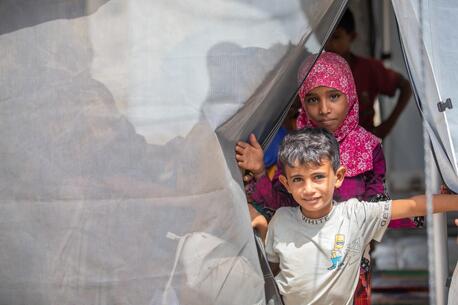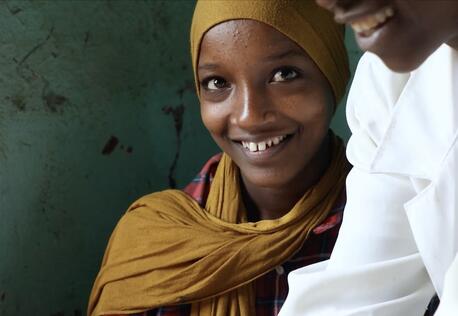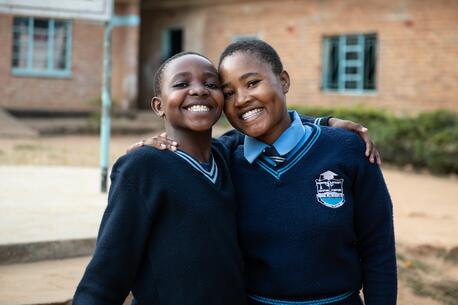
Women's Advice for Girls: Stay in School. Believe in Yourself.
All over the world, women are rooting for the next generation of girls. Mothers are dreaming of how their daughters' lives will be better than their own. Teenagers are standing up for the rights of younger girls. Wherever they are, women of all ages share the hope that tomorrow's girls will be free to make their own decisions about their futures, and to live independent, fulfilling lives.
"We vulnerable people can become community builders. We are the base and foundation."
"I am dreaming to become someone super in my universe," says 17-year-old Aya, a Syrian refugee living in Jordan's Azraq Refugee Camp. "Not something that is normal, like a lawyer or a doctor, no. I want to become something like a scientist. Scientists invent things. The community call us vulnerable. But we vulnerable people can become community builders. We are the base and foundation."

"I am dreaming to become someone super in my universe."
Aya (pictured above, her name has been changed for her protection) was just 16 when she married and dropped out of school, an experience she deeply regrets. She hopes life will be different for her 10-month-old daughter, Malak. Her advice to girls? "Education is everything." Aya's back in school now, and while she's in class, Malak plays at a UNICEF-supported nursery equipped with cribs, toys and books and staffed with professional caregivers.
"It is wrong what happened to me ... I should have finished my education."
"What drives me to seek an education more than anything else is that my daughter needs someone to take care of her," says Aya. "I will not allow her to get engaged in any relationship until she becomes successful in her community and has a degree. Because it is wrong what happened to me. It is really wrong. I should have finished my education first and achieved the things that I wanted. That would have allowed me to choose the right person to have a relationship with whenever I wanted. Someone who deserves me." © UNICEF/UN0287629/Herwig

"As long as you love your job, you find it easy."
UNICEF-trained midwife Uwingabire Mary (above, left) holds the firstborn baby of Kabugho Moureen after a long night shift at Kawempe Referral Hospital in Uganda. She has been caring for pregnant women and their babies for three years. Her advice for girls? "As long as you love your job, you find it easy. I like helping mothers, so it motivates me. That's what I like about it." © UNICEF/UNI259460/Abdul

"Education is important; it shapes our future. It helps us and it helps our children."
Seventeen-year-old Hoodoo was only 15 when she married in Lasadawaco, Somaliland. Almost half of all Somali girls get married before their 18th birthday. She dropped out of school when she gave birth to her son, Jimale, 8 months. Now, she has resumed her education with other child brides at a UNICEF-supported school. "Education is important; it shapes our future," she says. "It helps us and it helps our children." © UNICEF/UN0294471/Naftalin

"When girls plan, when girls go to school, when girls are not deprived of their childhood because of marriage, the world wins!"
"When girls plan, when girls go to school, when girls are not deprived of their childhood because of marriage, the world wins!" says Félicité Tchibindat, UNICEF's Representative in Niger. Above, Tchinindat (in UNICEF shirt) congratulates Pascaline, a teenager from a poor neighborhood in Niamey, Niger's capital, after her team won a soccer tournament. Pascaline attends Academie Atcha, a UNICEF-supported program that combines athletics and academics to keep at-risk girls in school. Niger has the world's highest rate of child marriage: 76 percent of women are married before their 18th birthday. © UNICEF/UNI211151/Haro

"I wanted to be the one, to be the best in school, but I could not. I'm very proud of her."
In the village of Vulcanesti, Republic of Moldova, 24-year-old Randunica (above, left) has some advice for her younger sister Renata, 14. "I went to school until the 9th grade," she says. "I wanted to study to be a psychologist. Unfortunately, it's not the custom for Roma girls to leave home to go to Nisporeni or Chisinau to study. So at 17, I got married." Now divorced and living at home again, Randunica encourages her sister to keep studying. "I like that she attends school every day. She learns well. I wanted to be the one, to be the best in school, but I could not. I'm very proud of her." © UNICEF/UN0243939/Dickinson

"You need to be prepared for anything in life. You can't depend on others to protect you."
"Girls need to feel safe when we grow up," says 14-year-old Dareen, who is going into the 9th grade in Mafraq, Jordan. "The best protection is education because, when we grow up, we will have to look after ourselves. You need to be prepared for anything in life. You can't depend on others to take care of you." Conflict in Syria forced Dareen's family to leave their home in Damascus and settle in Jordan. Life since then has been a daily struggle to survive. UNICEF's Hajati cash assistance program provides Syrian refugee families with grants to help children stay in school and to prevent girls from marrying young. © UNICEF/UN0221866/Rich
Your generous contribution supports UNICEF's work to give girls around the world the tools and opportunities they need to shape their own futures. Please donate.
Top photo: Displaced by armed conflict in northeast Nigeria, Julianna, 13, is one of three girls on the school-based management committee at the UNICEF-supported Kulmsulum School in Maiduguri, Borno State. She ensures that students have enough drinking water and keep classrooms clean, and steps in to resolve disputes as they arise. "I'm feeling happy," she says. "I came with nothing; now I have books and pencils. When I grow up, I will be someone in the future. I will be a doctor." © UNICEF/UN0322336/Kokic
HOW TO HELP
There are many ways to make a difference
War, famine, poverty, natural disasters — threats to the world's children keep coming. But UNICEF won't stop working to keep children healthy and safe.
UNICEF works in over 190 countries and territories — more places than any other children's organization. UNICEF has the world's largest humanitarian warehouse and, when disaster strikes, can get supplies almost anywhere within 72 hours. Constantly innovating, always advocating for a better world for children, UNICEF works to ensure that every child can grow up healthy, educated, protected and respected.
Would you like to help give all children the opportunity to reach their full potential? There are many ways to get involved.





